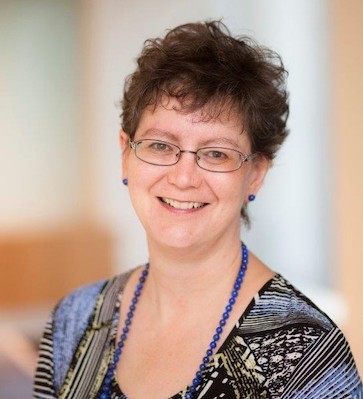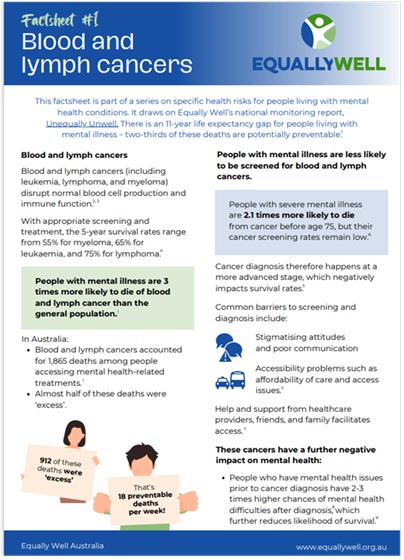“If you don’t diagnose a blood cancer early it can lead to worse outcomes, so as a GP you want to do whatever you can to get that patient the treatment they need as soon as you can.”
Blood and lymph cancers (including leukemia, lymphoma, and myeloma) disrupt normal blood cell production and immune function.
With appropriate screening and treatment, the 5-year survival rate is greater than 75% for the general population.
People living with a mental health conditions, however, are three times more likely to die of blood and lymph cancer, than the general population.
This complex set of cancers that we know are impacting people who have mental health conditions more than others, suggests a role for individuals and the health system in addressing change to help improve life expectancy for all.
Caroline suggests having a strong and ongoing relationship with a GP is one way, acknowledging that this is not always possible.
“Access to GPs is a broader issue but when you can get that relationship going, there is strong evidence of better health outcomes.
“We train GPs to look out for what we call ‘red flags’, especially for people at higher risk of certain conditions.
“It is a good thing that GPs today expect and look out for mental health conditions a lot more than they did in the past, given we know about 20% of the population will experience mental health conditions in each 12-month period.
“The problem now, is that people with more complex mental health needs can potentially be missed – the increase in attention that ‘it’s OK to talk about mental health’ offers doesn’t necessarily translate into getting the more complex health care they need.
“A good patient-centred GP will be wanting to meet the person where they’re at – but addressing physical and mental health care needs can be a delicate balancing act.”
Caroline sees GPs as having a critical role in advising about access to recommended health screening programs, but for people with complex health needs it’s also about helping them get the things they need to find the right solution for their individual needs.
“The cornerstone of General Practice is the biopsychosocial model of care but that’s not always the focus of the new doctor with so much medicine to learn. When you are able to have an influence on GPs-in-training, and when they realise that being a GP is much more than just giving people a diagnosis, it is like a lightbulb has gone on and you know they are going to be able to do their best to make a real difference.
“What happens though is that the systems that GPs need to access to provide that level of care are not always connected and that creates a lot of barriers – we still have work to do there.”
Caroline draws attention particularly to that link between state-based mental health services and primary health care, which she says is still very weak and where people fall through the cracks.
“Like all social justice issues it’s (Equally Well) an issue of equity. My issue is that some of the solutions being suggested imply there is a level playing field for all.
“The patients I really worry about in my clinic are those people who don’t have those strong family networks or people to support them – who will advocate for them?”
Caroline sees that change is possible if we can maintain the pressure on policy and practice to be innovative and proactively look for ways to do things differently.
“What I hope for, is that in the future we have more health guidelines that account for multi-morbidity – that we actually start to think about what people need with these multiple conditions rather than treating each condition in isolation, which I think we are uniquely able to do in General Practice.
“We need to work hard to keep up that pressure to make governments accountable too – it is completely disgraceful that people with serious mental illness can’t access some of the free screenings that are available – but that’s only part of the issue – we need to ask what can we do to make sure people can also get access to the treatment, for conditions like cancer etc… when they need it.
“Even if we get early screening, the systems for getting access to treatments can be quite complex to navigate if you also have a serious mental illness.
“I think we not only need to be looking at better screening rates but that the pathways to care after that for people living with mental illness, are much better than they currently are.”
Caroline runs mental health training for GPs and says they really do care about how to improve that holistic care for their patients and help improve those mortality gaps.



